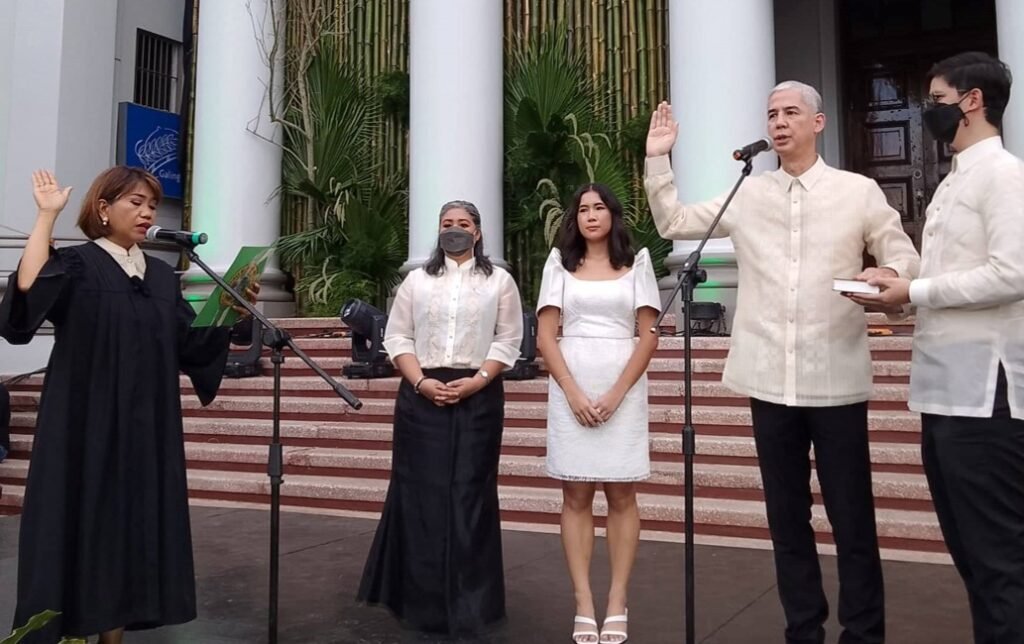Governor Eugenio Jose Lacson outlined his three-year priority programs and projects for Negros Occidental, as he pledged his utmost dedication and commitment to do not just according to his best, but according to “what is called for and what is necessary” to make the province more progressive.
Lacson said he considers the inauguration of all provincial elected officials Saturday not only as the start of a new term of governance, “but also of a decisive period, of a major turning point for Negros Occidental”.
“I would not be as confident to assume this office if I were not certain that the entire Sangguniang Panlalawigan, under the leadership of a good friend, the Honorable Vice Governor Jeffrey Ferrer and the entire Provincial Government of Negros Occidental, are not only capable, but are ready of sharing, in full measure, the hard work, dedication, and probity that government service demands,” Lacson stressed during his inaugural address Saturday at the Provincial Capitol grounds in Bacolod City.
He took his oath of office before San Carlos Judge Amy Alabado-Avellano, while Judge Irene Bonghanoy administered the oath to Ferrer.

Sagay RTC Executive Judge Reginald Fuentebella administered the oaths to 12 elected SP board members, in the presence of their respective families.
“No people in recent history had been called upon to overcome the obstacles that tested our resolve as human beings. Yet, I have great faith in our ability as a people, as Negrenses, to overcome,” Lacson said.
He added that the country’s long standing fight against poverty, unemployment, lawlessness, substance abuse, climate change, and the recent global crisis caused by COVID-19, demands no less than the united and absolute cooperation and accord of everyone.
In his new term as governor, Lacson said the provincial government will fully implement the Universal Health Care Program, and expand and strengthen the existing Provincial Health Board through the six Inter-local Health Zones.
The Teresita Lopez Jalandoni Provincial Hospital in Silay City, which will be the province’s premier hospital, with fully equipped state of the art facilities, will be converted from Level 2 to Level 3 hospital to accommodate more than 300 patients.
The Lorenzo D. Zayco District Hospital in Kabankalan City and Cadiz District Hospital are also up for upgrading from Level l to Level 2, to serve up to 100 in-patients. The equipment and infrastructure facilities of eight other district hospitals will also be modernized.
He also enjoined local government units to adopt the One Hospital Command program, to further simplify the process of providing Negrenses with rescue and medical interventions in times of emergency.
Lacson said the provincial government will also establish centers for Children in Situation of Armed Conflict, Children in Conflict with the Law or the Bahay Pag-asa and Half-way House for rebel returnees, operationalize the sectoral offices for solo parents, local youth development, senior citizens, persons with disabilities, and women.
Given the COVID-19 and Typhoon Odette experiences, the provincial government will also expand the scope of services of its Provincial Disaster and Management Office, to manage resources, including manpower, to effectively match the emergency needs of constituents through the One Hospital Command, Emergency Rescue 911, and Command and Response Center.
It will also further improve the set-up of the Automated Early Warning System with the installation of repeaters in critical areas of local government units to improve the response of concerned barangays in times of emergency.
Education remains to be a priority of his administration, Lacson said, adding he will continue to expand the province’s scholarship programs to make them more inclusive and accessible to all sectors, particularly the underprivileged.
The provincial government will continue to work closely with the Department of the Interior and Local Government, Armed Forces of the Philippines and National Police, civil-society groups, and multi-stakeholders to implement peace-building activities, particularly in the rural communities.
“We will continue to provide socio-economic interventions to our former rebels, including subsidies for the education and health cards of their dependents,” he added.
Lacson also said that the Provincial Veterinary Office and Office of the Provincial Agriculturist will complement and integrate their services to provide our people sufficient food sources — livestock, poultry, swine, crops, vegetables, and marine products.
The OPA is also strengthening the potentials of farm centers in the cities of Bago, Himamaylan and Victorias and the municipality of Moises Padilla, and to increase the number of seed-banks all over the province, as Lacson vowed to intensify the drive towards farm mechanization, to provide adequate labor support to farmers to help increase agricultural production and promote rice self-sufficiency which will allow farmers to sustain the needs of their families especially during lean times or “tiempos muertos”.
To ensure the availability of safe, clean, and potable water, the province will undertake the establishment of bulk water projects that will tap surface water that mostly reaches the sea unutilized.
For the next three years, Lacson said the implementation of the Integrated Provincial Safe Water Program will serve as the banner project for the Environment sector.
Under its economic development tourism, the provincial government is aiming to recover the income lost during the pandemic and Typhoon Odette by improving Economic Enterprises development initiatives, with the full operationalization of the Food Terminal Market or Pala-pala, and the Negros Residences, as income generating facilities./GB




